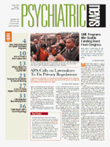The new federal rule protecting the privacy of patients’ medical records has too many exceptions that can undermine patient protection. That was the message APA sent to the Senate Health, Education, Labor, and Pensions Committee last month at a hearing on the pros and cons of the final rule.
Since the Clinton administration released the final rule in December, several groups including APA have expressed concerns about troubling provisions (Psychiatric News, February 2).
While APA praised the Senate committee for its “continued commitment to protecting medical records privacy,” its written testimony calls on committee members to strengthen the privacy rules further by addressing these concerns.
“APA is concerned about prospective blanket consent forms that a patient signs without knowing what information would be disclosed or who would receive it,” APA testified. “APA is also concerned about the marketing and fundraising loopholes, law enforcement, and other provisions.”
The marketing provision allows physicians, clinics, hospitals, and other entities that normally have access to medical records, including business associates under contract with them, to send out individualized health information and product promotions. For example, a patient who had been treated for sexually transmitted diseases could receive telemarketing calls about condoms or new medicines, according to the January 16 Washington Post.
The fundraising provision allows foundations affiliated with medical facilities access to patient names, demographic information, and dates of care to use for fundraising purposes, according to Nancy Trenti, an associate director of APA’s Division of Government Relations.
“APA is particularly concerned about the need for sensitivity regarding psychiatric patients’ names,” commented APA President Daniel Borenstein, M.D., in a press release. “Fundraisers should not be allowed to take advantage of patients, especially those with mental illness.”
APA also complained in its testimony that the rule’s law enforcement provisions allow medical records to be disclosed in response to summonses and subpoenas from an investigating authority.
“APA strongly believes an independent review by a judge is needed to decide whether a patient’s records should be released in civil, criminal or administrative proceedings,” said Trenti.
Congress has the authority under the Congressional Review Act to review regulations issued by federal agencies and to decide whether to approve, change, or reject them, according to Trenti.
APA would like to see Congress enact stronger medical privacy legislation that fixes the loopholes and other troubling provisions. Patients should also have a right to sue if their private health information is abused or misused, according to Trenti.
The Bush administration may also review the final rule. President George W. Bush issued an executive order on January 20 requiring a 60-day review of regulations that had been announced but not yet published in the Federal Register or gone into effect before January 20. The medical privacy rule was published in the Federal Register on December 28 with an effective date of February 26.
Trenti noted that the administration could overturn the rule, which would require a repeat of the lengthy rule-making process.
Moreover, a spokesperson for the Department of Health and Human Services (HHS) said at press time that the agency was deciding whether the executive order applied to the medical privacy rule and other rules issued toward the close of the Clinton administration.
APA’s summary of the “Final Standards of Privacy for Individually Identifiable Health Information” is posted on APA’s Web site at www.psych.org/pub_pol_adv/finalprivacyregulation1401.pdf. ▪
